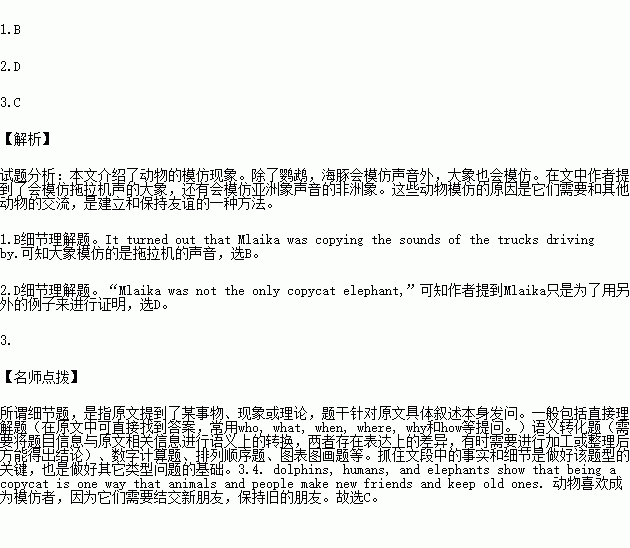题目内容
You may have seen a talking parrot on a TV show, in a movie, or even in someone’s home. The parrot has learned to copy sounds that people make. Birds are not the only animals that can copy the noises they hear. Dolphins, bats, and some apes also copy sounds. Now we can add elephants to this list of copycats.
Dr. Joyce Poole is a zoologist. She studies the sounds of elephants. While she was in Kenya, she would hear strange noises made by Mlaika after sunset. Mlaika was a 10-year-old African elephant.
Mlaika lived near a highway. Dr. Poole says, “I could not tell the difference between Mlaika’s call and the distant truck noise.” She and other scientists studied Mlaika’s sounds. It turned out that Mlaika was copying the sounds of the trucks driving by. Why would Mlaika copy trucks that she heard going by on the highway? Animals that are able to copy sounds may enjoy practicing new sounds. When they are kept outside of their natural environment, they may copy unusual sounds. That may be why an elephant would copy the sound of a truck.
“Mlaika was not the only copycat elephant,” Dr. Poole says. Calimero is a 23-year-old male African elephant. He spent 18 years with two female Asian elephants. Asian elephants make chirping sounds (sounds made by birds) to talk with one another. African elephants usually do not make chirping sounds. But Calimero now does. He is copying his Asian elephant friends. Dr. Poole says that elephants need to form bonds with their family and friends. She says, “They make sounds to communicate with each other. When they are separated, they use sounds to keep in contact.”
Parrots, dolphins, humans, and elephants show that being a copycat is one way that animals and people make new friends and keep old ones.
1.According to Dr. Poole, what does Mlaika copy?
A. The sound of people.
B. The sound of trucks.
C. The sound of Calimero.
D. The sound of birds.
2. From paragraph 4, we can know ________.
A. Calimero is a 23-year-old male Asian elephant
B. African elephants never make chirping sounds
C. Asian elephants make chirping sounds to talk with birds
D. Elephants make sounds to keep in touch with each other
3. According to the passage, animals like to be copycats because they need_______.
A. To keep in touch with nature.
B. To please people and other animals.
C. To make new friends and keep old ones.
D. To avoid danger from the outside world.

